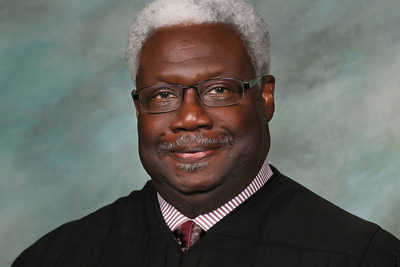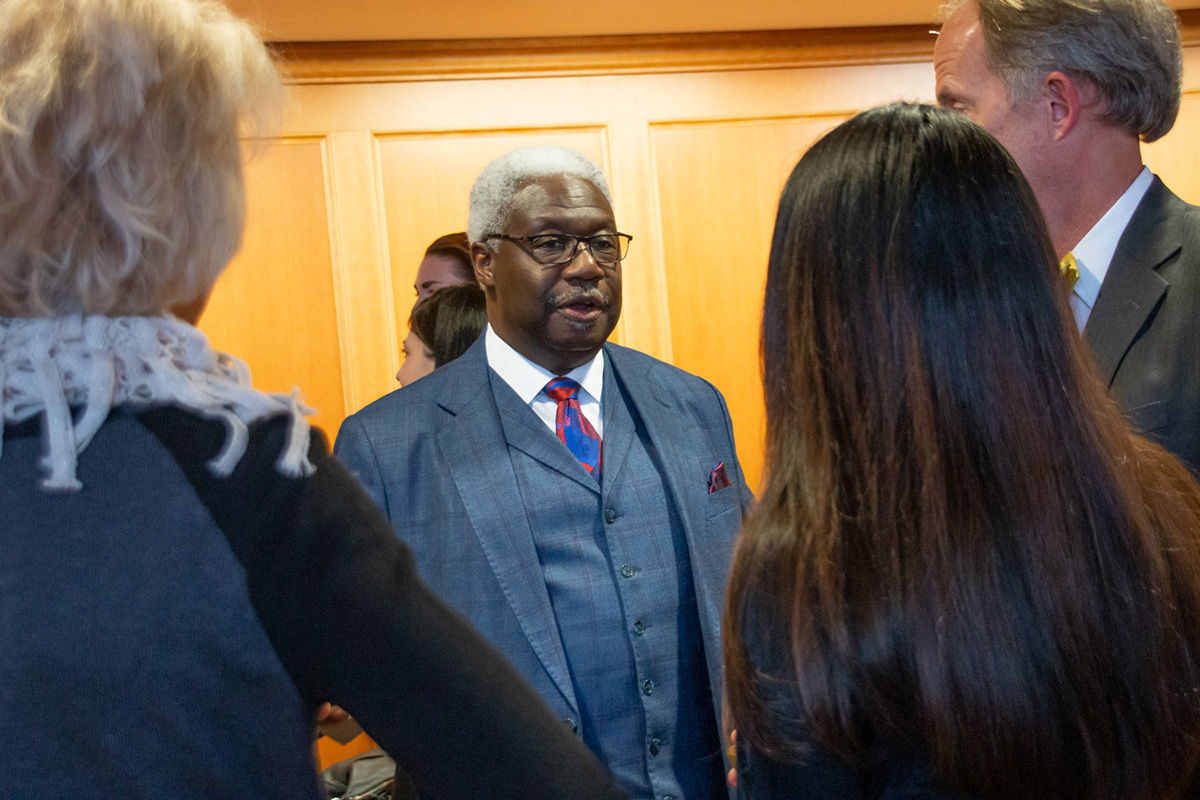Fifth Circuit Judge Carl Stewart gives keynote address for ND Law's Program on Ethics, Compliance & Inclusion

Themes of inclusion and using one’s opportunities to benefit others were prevalent as Judge Carl E. Stewart of the U.S. Court of Appeals for the Fifth Circuit spoke to Notre Dame Law students about his life and career in law on October 8.
Stewart’s talk was the fall keynote address for Notre Dame Law School’s Program on Ethics, Compliance & Inclusion. The virtual event was co-sponsored by the Law School’s Black Law Students Association. He was introduced by Naomi Price, a second-year law student and president of BLSA.
Stewart told students about the path that took him through a trailblazing career that has led to 26 years on the Fifth Circuit. That path also included serving as a captain in the United States Army as part of the Judge Advocate General’s Corps, and a federal prosecutor for the U.S. Department of Justice. He also served as a Louisiana trial court judge and as an appellate judge for the Louisiana Court of Appeals for the Second Circuit, in Shreveport, Louisiana.
In 1994, then-President Bill Clinton appointed Stewart to a newly established seat on the Fifth Circuit. He was the first African American to serve as the Fifth Circuit’s chief judge, a position he held from 2012-2019.
He said his early personal experiences with racism prepared him for his pathway, and for often being the “first one, only one,” as Stewart described it. He said that it can be isolating to be the first in a lot of these nontraditional work spaces where people of color have not always been. He says he tries to make a difference and maximize the opportunities he has been afforded and to be a credible voice, to ask questions, and to challenge things that aren’t right.
Stewart graduated from a segregated all-Black high school. He watched his parents lose the opportunity to purchase their first home because a group of white people did not want a Black neighborhood near theirs. He heard racial slurs in the workplace during his law school years.
He said he navigated through it, continuing to reach his goals. When he was first elected as a judge on the district court, he was the only African American.
His father encouraged him and his two brothers, who also became attorneys, to do their very best and to try to make a difference in the way society operates. He said growing up in the turmoil of racial unrest, he saw that lawyers could make a difference in society.

Specifically addressing students of color, he said that they will receive many opportunities based on merit, hard work, and the relationships they build. But what is important is what they do with those opportunities.
“Once there, what are you going to do?” he asked. “As more people of color enter nontraditional spaces, it is important to maximize these moments. What are we going to do to be resourceful, to help others, to build bridges, and to fuse enthusiasm for coming generations?”
Stewart encouraged students, adding, “As you have opportunities to be the first one, the only one, seize the opportunity to make a difference. Form relationships and leverage those relationships to benefit others. It is a catalyst for opportunity, not just for ourselves but others as well.”
“Our presence in the space makes a difference,” Stewart said. “Being there gives you the opportunity to speak, to share, to give insights because some have not had that frame of reference that you have.”
When he was chief judge, one of Stewart’s responsibilities was running the annual judicial conference for the circuit. Historically, the only way to be invited was by an Article III judge. They would invite the same people over and over, and it was difficult for new people to get in, Stewart said. As chief judge, he used his discretion to invite more people such as lawyers from the minority bar associations, public defenders, solo practitioners, attorneys in rural areas — people who would otherwise not be included. The conference used to be run by one judge. Instead, Stewart organized a committee of people to organize the conference, again to include more people and bring more diverse perspectives. It was met with overwhelming enthusiasm.
Stewart had been invited to his first conference years before by the late Judge Tom Stagg of the U.S. District Court for the Western District of Louisiana. Later, he appreciated the feeling of a person who has been included, who would otherwise have been excluded. And it was a blessing, he said, to now be able to do that for others.
Stewart said, “Not everyone is hostile to different points of view, they just don’t have the same frame of reference, so it's up to us to be in the space and to help provide alternative thoughts. It can make a difference in the way people look at situations.”
He said diversity or inclusion “does not have to be a poison or a castor oil. Embrace it, utilize it, be creative, be resourceful so we can involve a myriad of people, because we all learn from each other and from each other’s experiences. Everyone benefits.”
Stewart served on the Judicial Conference of the United States when he was chief judge of the Fifth Circuit, and he was appointed to the Conference’s Executive Committee by Chief Justice of the Supreme Court John Roberts in 2017. He previously chaired the Judicial Conference Advisory Committee on Appellate Rules and recently served as Strategic Planning Coordinator for the Judicial Conference of the United States.
Throughout his career, he has hired 93 law clerks of all races, including 55 women. Veronica Root Martinez, professor of law and director of the Program on Ethics, Compliance & Inclusion, was one of those clerks.
“I am thrilled Judge Stewart took the time to provide such deeply personal and thoughtful reflections on his life and career,” Martinez said. “He is truly an inspiration for all students and a model for how one can pursue a career in the law while maintaining a deep commitment to promote notions of equality and inclusion throughout the legal profession and beyond.”